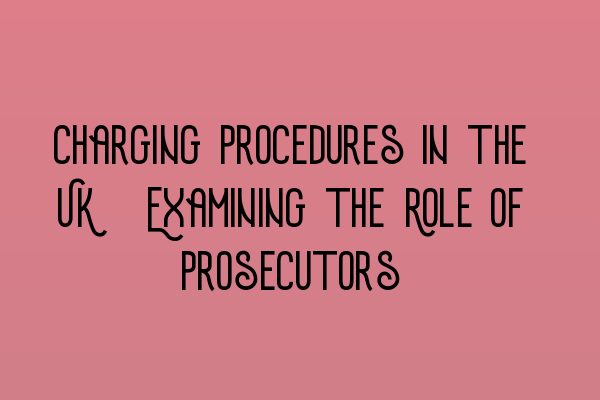Charging Procedures in the UK: Examining the Role of Prosecutors

When it comes to criminal cases in the UK, the charging procedure plays a crucial role in the legal process. It is the responsibility of the prosecutors to determine whether there is sufficient evidence to bring charges against a suspect. In this article, we will delve deep into the charging procedures in the UK and examine the vital role that prosecutors play.
Overview of the Charging Procedures
The charging procedure begins when the police have collected evidence and believe that a crime has been committed. It is then their duty to submit the evidence to the Crown Prosecution Service (CPS) or other prosecuting bodies, who will review the evidence and decide whether to lay charges. The decision-making process involves careful consideration of the available evidence and the public interest.
Prosecutors have an essential role in ensuring that charges are only brought when there is a reasonable prospect of conviction. This means that the evidence must be sufficient and reliable enough to prove beyond a reasonable doubt that the suspect is guilty. Prosecutors also consider whether it is in the public interest to pursue the case, taking into account factors such as the seriousness of the offense and the impact on the community.
Factors Influencing Charging Decisions
Prosecutors take various factors into account when making charging decisions. Some of the key factors include:
- The strength and credibility of the evidence
- The seriousness of the offense
- The harm caused to the victim and the community
- The suspect’s criminal history, if applicable
- Any aggravating or mitigating circumstances
- The availability and reliability of witnesses
Prosecutors and the Decision-Making Process
The decision-making process of prosecutors includes careful analysis of the evidence provided by the police. They will assess whether the evidence is admissible, credible, and sufficient to proceed with charges. Prosecutors may also request additional evidence or seek further clarification from the investigating officers.
It is crucial to note that prosecutors must act impartially and independently. Their role is to uphold the rule of law and ensure that justice is served. They are not advocates for the police or the defense but rather the gatekeepers of justice. Their primary duty is to ensure that the right cases are brought to court and that the guilty are prosecuted while preserving the rights of the accused.
Importance of Effective Prosecution
Effective prosecution is vital for maintaining public confidence in the criminal justice system. When charges are brought fairly and supported by robust evidence, it enhances the credibility of the legal process and ensures that the guilty are held accountable for their actions. Conversely, a lack of effective prosecution can lead to miscarriages of justice and erode public trust.
To become a skilled prosecutor, one must possess a deep understanding of criminal law and the charging procedures. The SQE 1 Preparation Courses offered by SQE Criminal Law & Practice Law UK provide aspiring lawyers with the knowledge and skills required for a successful legal career. These courses cover key topics such as criminal law, evidence, and procedure, enabling candidates to excel in the SQE examinations and beyond.
Conclusion
The charging procedures in the UK are an integral part of the criminal justice system. Prosecutors play a crucial role in determining whether charges should be brought, taking into account the strength of the evidence and the public interest. Effective prosecution is essential for maintaining public confidence in the legal system and ensuring that justice is served.
If you are preparing for the SQE examinations or seeking to enhance your knowledge of criminal law and practice in the UK, explore the comprehensive SQE 2 Preparation Courses available at SQE Criminal Law & Practice Law UK. These courses are designed to equip you with the necessary skills and expertise to excel in your legal career.
For more information about the SQE exam dates and other aspects of the SQE, refer to the article on SRA SQE Exam Dates.
Are you ready to put your knowledge to the test? Check out these SQE 1 Practice Exam Questions and SQE 1 Practice Mocks FLK1 FLK2.
